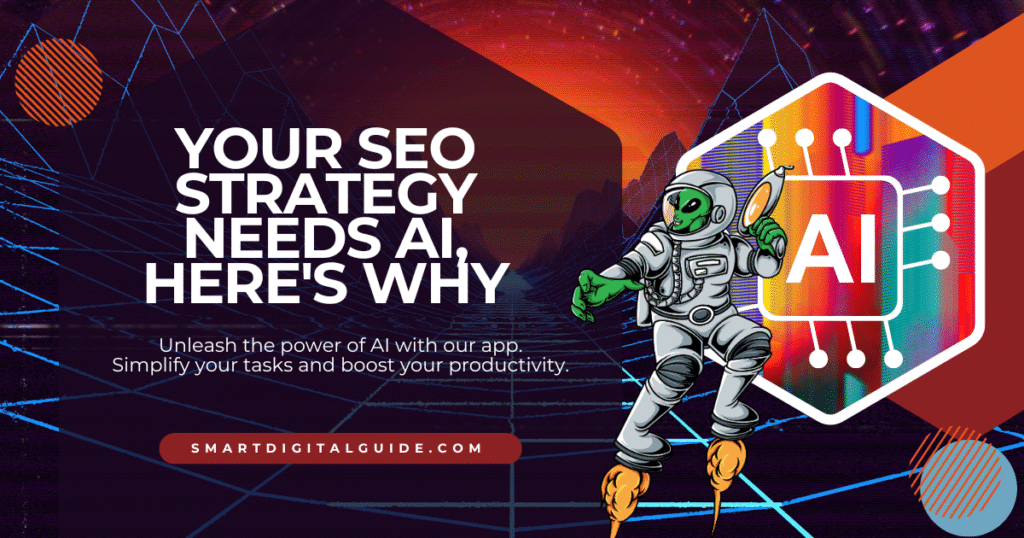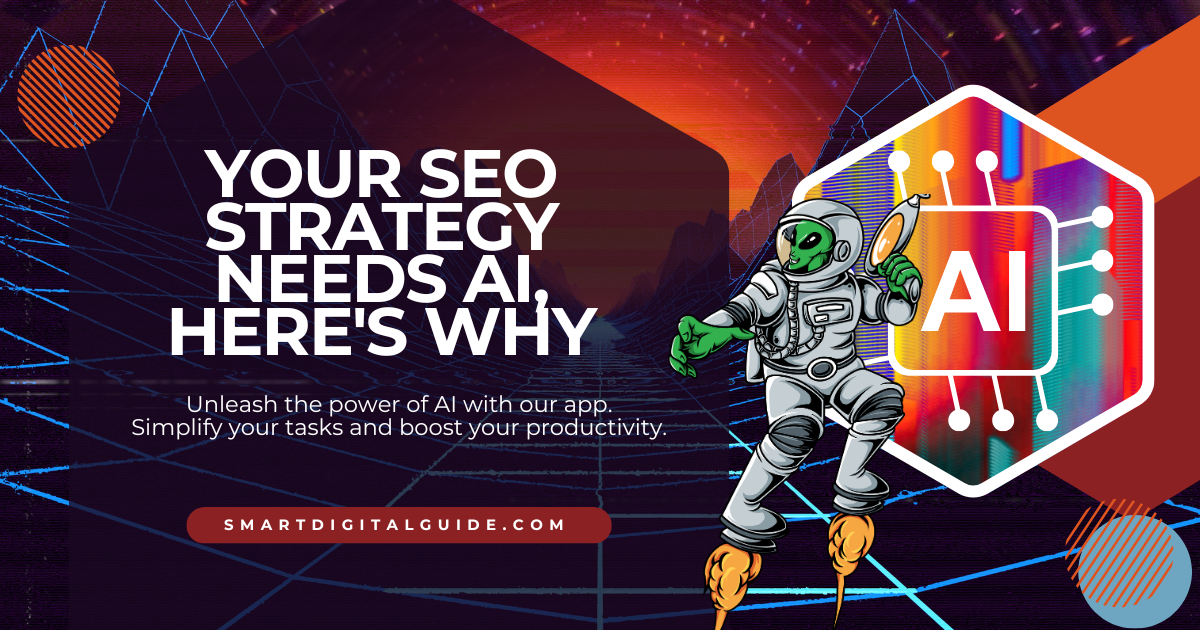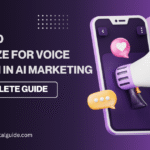In today’s fiercely competitive digital landscape, SEO (Search Engine Optimization) is rapidly transforming. Strategies that succeeded five years ago — or even those from last year — may no longer be effective. Search engines such as Google are continuously fine-tuning their algorithms to provide more precise, user-centric results. Consequently, marketers, bloggers, and businesses must quickly adjust their tactics.
The reality is this: AI (Artificial Intelligence) isn’t just a future prospect for SEO; it’s already here.
If your SEO approach lacks AI-driven tools and insights, you risk falling behind competitors who have embraced them. From keyword analysis to content enhancement and rank monitoring, AI is fundamentally changing our methodology in search optimization. Let’s explore why integrating AI into your SEO strategy is essential now—and how you can leverage its benefits effectively.

1. AI Enhances the Speed and Intelligence of Keyword Research
Keyword research has always been fundamental to SEO strategies. However, the process of manually sifting through search volumes, competition metrics, and relevancy can be laborious and susceptible to errors.
AI-driven SEO platforms such as Semrush, Ahrefs, and Surfer SEO are capable of processing millions of search queries in mere seconds. Their capabilities extend beyond basic search volume analysis; AI can:
- Recognize semantic keywords along with opportunities for long-tail keywords.
- Forecast keyword trends using historical data patterns.
- Evaluate user intent to ensure you’re targeting exactly what users are searching for.
For instance: Rather than focusing on “digital marketing tips” (which faces stiff competition), AI might suggest “AI-enhanced digital marketing strategies for small enterprises” as a lower-competition alternative with better ranking potential.
2. AI Enhances Content Creation and Optimization
The era of relying on keyword stuffing to boost rankings is over. Nowadays, search engines favor content that is high-quality, relevant, and engaging. But how can you consistently produce material that appeals to both audiences and algorithms? This is where AI comes into play.
AI writing tools and content optimization software examine the highest-ranking pages and offer real-time recommendations for:
- – Placement and frequency of keywords.
- – Enhancements in readability.
- – Organizing headings and subheadings effectively.
- – Incorporating related terms and questions.
- – Adhering to E-E-A-T guidelines (Experience, Expertise, Authoritativeness, Trustworthiness).
For instance: When exploring the topic of “AI in SEO,” an AI tool might suggest including sections such as “Advantages of AI in keyword research” or “How AI influences Google ranking factors”—ensuring a thorough exploration of the subject.
3. AI Enhances Your Understanding of User Behavior
Search engine optimization is not solely about achieving high rankings; it’s fundamentally about driving conversions. You might attract a multitude of visitors, but if they fail to engage with your content or take meaningful actions, your efforts will fall short.
AI-powered analytics platforms such as Google Analytics 4 (GA4) and Hotjar are equipped to monitor and forecast:
- – The pages that captivate users for the longest time.
- – Points within your sales funnel where users disengage.
- – The types of content that yield the highest conversion rates.
By examining this information, you can fine-tune your SEO approach to concentrate on those pages, keywords, and formats that produce tangible results.
For instance: If artificial intelligence data reveals that blog entries featuring infographics receive higher engagement levels, you may want to focus on developing more visually-driven content to enhance user retention and decrease bounce rates.
4. AI Improves Accuracy in SEO Reporting
Conventional SEO reports can often be daunting due to their abundance of raw data that’s difficult to analyze. However, artificial intelligence streamlines this task by producing actionable insights instead of merely presenting figures.
AI reporting tools have the capability to:
- – Detect abrupt drops in rankings and provide potential explanations.
- – Illuminate keyword opportunities that you’re currently overlooking.
- – Anticipate future trends in traffic patterns.
5. AI Personalizes the Search Experience
Google’s search algorithms are placing greater emphasis on personalized outcomes by analyzing user actions, geographical location, and the devices employed for searching. As a result, your SEO content should be customized to cater to various audience segments.
AI can assist you in:
- – Classifying your audience based on demographics, behavior patterns, and preferences.
- – Providing tailored content along with product suggestions.
- – Enhancing optimization for mobile searches and voice queries.
For example: An online retail platform that leverages AI can adjust product recommendations in real time based on a user’s earlier browsing activities, which boosts engagement rates and drives higher sales.
6. AI in Optimizing Voice Searches
With smart assistants such as Alexa, Siri, and Google Assistant becoming integral to daily routines, focusing on voice search optimization is essential. AI plays a role by comprehending natural language inquiries as well as the conversational keywords people tend to use when speaking their requests rather than typing them out.
For instance: Instead of entering “best pizza near me,” someone using voice search might ask: “Where’s the best pizza place that’s open nearby?” Tools powered by AI can improve how your content resonates with these lengthier and more conversational phrases..
7. Enhancing Technical SEO with AI
Key aspects of technical SEO, including site speed, mobile responsiveness, structured data, and more, are essential for securing high search engine rankings. AI-powered tools like Screaming Frog and Sitebulb can swiftly analyze your website to identify:
- – Broken links
- – Duplicate content
- – Absent meta descriptions
- – Pages that suffer from slow loading times
In addition to merely pinpointing these issues, AI can also provide actionable insights for solutions and may even automate the fix process in some cases.
8. Staying Updated with Algorithm Changes
Each year, Google makes hundreds of modifications to its search algorithm. Some of these changes are minor; however, others — such as the Helpful Content Update — can significantly affect your site’s rankings.
AI technologies can track SERP changes in real time while predicting how future updates might influence your website’s performance. This allows you to implement necessary adjustments proactively before any potential drops in ranking occur.
Practical Steps to Incorporate AI into Your SEO Strategy
If you’re prepared to integrate AI into your SEO strategy, here’s a concise action plan:
- Select AI-Driven SEO Tools – Examples include Surfer SEO, Jasper AI, Clearscope, and Frase.
- Automate Keyword Discovery – Allow AI to identify fresh keyword opportunities on a weekly basis.
- Utilize AI for Content Outlines – Develop outlines rooted in competitor insights.
- Capitalize on Predictive Analytics – Anticipate trends in keywords and fluctuations in traffic.
- Optimize for Voice Search – Integrate conversational phrases and Q&A sections in your content.
- Monitor Technical SEO – Conduct automated audits consistently.
Concluding Thoughts: The Benefits of AI
Integrating AI within your SEO approach is not about supplanting human creativity — it’s about augmenting it. With the speed, data analysis, and predictive capabilities that AI offers, you can make well-informed decisions while you infuse experience, narrative flair, and brand identity that resonates with genuine audiences.
The digital environment is bound to become increasingly competitive. Companies willing to leverage AI in their SEO strategies today will likely see accelerated growth, improved rankings, and enhanced ROI tomorrow.
Thus, the key question isn’t whether your SEO strategy should incorporate AI; it’s how swiftly you can implement it to outpace competitors.









